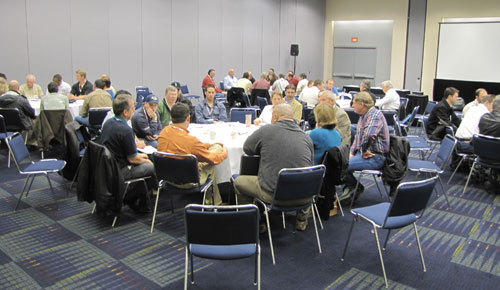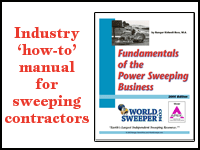
Click on the logo to go to the NPE website.
2010 "Best Practices" for Power Sweeping Contractors
This information came from a workshop held at the 2010 National Pavement Exposition.

The seminar was moderated by Gerry Kesselring, president of Ohio-based Contract Sweepers & Equipment.
In the three-hour seminar, each of the approximately seminar 75 participants had an opportunity to split out and contribute to three different topic areas. All but one of the topic areas was facilitated by the owner of a substantial-sized sweeping company.
The non-contractor facilitator was Scott Anderson, property management professional for Colliers Management.
At the end of the roundtable discussions in each area, the facilitators provided a brief report to the group as a whole on the highlights of what had emerged within their topic areas. Below is the information about each of the modules that the facilitators provided to WorldSweeper.

Discussion topics covered included the following. Click on the title, or scroll down the page, to view and/or listen to the information provided to WorldSweeper by each of the facilitators.
 " "
One of the key discussion points at the table each time was not only what to measure, but what should be shared. The conversation often focused around the reality that providing information to operators and staff can be tricky, and at times risky. Many of the participants felt that operators did not have the knowledge to understand information regarding the organization's measurements.
This response was often met with the discussion that if you don't provide a certain level of feedback to the staff, they will make their own assumptions. This was followed by: those assumptions are invariably wrong and more troubling to the organization than providing basic financial information.
It was frequently said as small business owners it is our nature to keep tight control over our companies and become reluctant to share key measurements. It was nearly unanimous by the end of each session that there are certain items that can be shared without the owners feeling like they are opening up too much, while still allowing the staff greater understanding of the business.
Some of the very unique and different measurements that people are looking at and reviewing are:
- Overtime as a percentage of total labor: Mike Lucht, of Progressive Sweeping, noted that he looks at this percentage on a weekly basis. He has found that this indicator needs to stay within a range. If it falls too low it means he has too much staff. If it moves outside the range he needs to add staff.
- Pete Phillips, of Clean Sweep in Chattanooga, shares his tire usage with his operators. Pete lets his staff know how many miles he is getting out of each set of tires. Pete says that by doing this it allows operators to understand how their actions impact the life of a tire.
- Karl Stauty, of Commercial Power Sweeping in Suffolk, Virginia, shares with his operators at the end of each year what their total compensation package is. Karl not only takes into account their wages, but adds in items such health insurance, vacation and other company-provided benefits. His staff is often surprised at what the total package turns out to be. It was commented on that others then take this annual figure and divide it by the total hours worked for the year to give an hourly rate calculation.
- Many of the participants talked about giving the operators a target time for each job and route. This information is printed on the route sheets on a nightly basis. This provides the operator with an expectation on how long a job should take. It was added upon by Debbie Dodson, of Mid State Industrial in Eugene, Oregon, that management then should look to make sure the times fall within an acceptable range.
It was also commented that operators have a tendency to expand the work to the time allotted. One keen observer stated that he cut each of his "target times" by 10% and the operators hit the new times without any effort.
- To a person all those at the table that had the privilege of hearing Kraig Kramers speak said they were going to go back to their office and review not only what they were measuring, but were going to measure their business in a whole new way.


Gabriel Vitale, C & L Sweeper Service Corp., facilitator
Principal, C & L Sweeper Service
Vitale chose to provide his information in the format of an audio interview recorded via telephone with WorldSweeper.com's editor, Ranger Kidwell-Ross. The approximately 15-minute audio may be accessed via the player shown below.
Note: The audio interview will play without downloading any files onto your computer. If you hear the interview at 'chipmunk speed,' you will need to download the latest version of Adobe's free Flash player.
Note: To play the interview, click
this link or on the small triangle inside the circle you see to the left. If you have any trouble accessing this audio, please let us know.


Kevin Kroeger, DSS Sweeping Service, facilitator
President, DSS Sweeping Service
One of the toughest tasks we have as Owners / Managers of sweeping companies is hiring the right people to do the job. There are many ways to get candidates to apply for a job opening. These include:
- Newspaper ads
- Employee referral
- Employment agencies
- Social Networking sites like Facebook and Linked In
- Signage on your building or trucks
Once you get the applicant interested, what's next? There were many experiences and tips shared. Some were:
- Be upfront about the job and its requirements. You would rather have someone not apply instead of start but then quit after a couple of shifts because they did not understand the job requirements.
- Some companies have the applicants listen to a pre-recorded job description on the telephone in order to make sure each applicant gets the same, complete information.
- There are many interviewing techniques. Make sure you ask open questions and listen closely to the applicant. Many times, interviewers spend too much time explaining the job, and not enough time listening to the applicant and making sure they are a good fit for the organization.
- Make sure the prospect has a clean Motor Vehicle Record (MVR). Many companies require the applicant supply a 36-month MVR with their application. Your insurance company might also provide this service.
- Do a background check and follow up on references. Make sure you get approval from the applicant to perform these checks. This approval can be part of the application.
- Many companies perform simple tests to make sure the applicant has the ability to read and follow directions, and knows the general geography of the company's service area. These tests might include labeling a map with the major highways and roads in the area, labeling a compass, determining left and right hand turns, and in some cases, an actual driving test.
- Although the implementation varies, all agreed it was important to perform a pre-employment drug screen. Some have the applicant pay for the drug screen up front, and then reimburse the applicant when the results come back clean. Some complete the drug screen before they make a job offer, while others make a job offer contingent on passing the drug screen. Make sure you understand your local laws concerning drug screens. In some locations, you may be required to hire someone if they pass the drug screen.
Once you hire the person, they need to be trained. Methods and length of time vary. Some train one week with an experienced operator, and then put the new operator on short routes and provide a lot of phone and inspection support.
Others hire new operators as assistants to experienced operators. These assistants would perform the handwork tasks, such as blower work, porter, and trash can service until they are prepared to be on their own. There are many other methods. Whatever method you choose, it is important to stay in contact with new operators to answer questions, provide feedback, and perform additional training as necessary.


Scott Anderson, CCIM, RPA & FMA, vice-president of Colliers Management
The main topics covered were how to market your services to property managers and what is expected after you secure the business.
Marketing
Cold calls do not work: Property managers' schedules are tight. Some of the top recommendations were:
- Referrals from other Property Managers
- Become active in trade associations like BOMA, IREM, IFMA, ICSC, etc.
- Become active in your own trade association, NAPSA, and qualify for Certification. Property managers respect certifications from all industries.
- Lunch and Learn: Bring in lunch for the property manager's office and spend 20-30 minutes being the expert on the benefits of sweeping and why someone should use your company.
What is expected?
Expectations will vary from company to company but most property mnagers will agree on the following:
- Do what you say you are going to do.
- Communicate any issues or concerns in a timely manner. Do not let the Property Manager be surprised.
- Respect the property and its tenants.
- Act as a partner not a vendor. Keep the property's best interest in mind.

If you have comments or further information on this article, please let us know.

|









|







